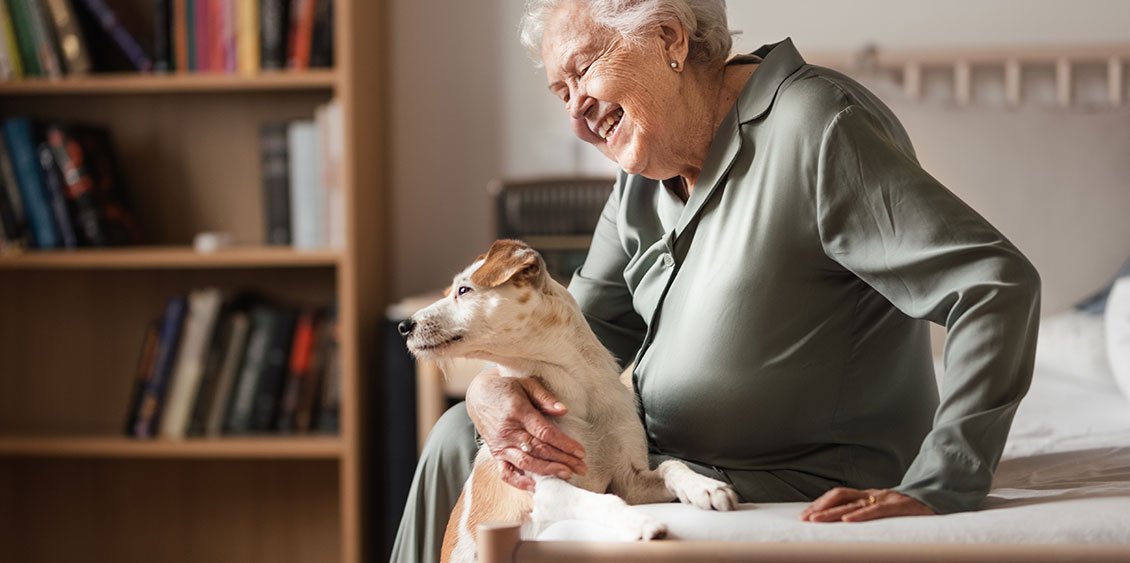There are many reasons why seniors might isolate from the outside world. And once they do, it can be difficult to re-engage with their community. What are the causes and effects of loneliness in seniors? How can you help the seniors you care about who are experiencing isolation? Let’s take a closer look.

Loneliness: a mighty adversary
The face of loneliness is all around: in the senior sitting alone on a park bench feeding pigeons, looking out a window at the cars driving by, or rocking in a chair on a balcony.
Loneliness is defined as a perceived lack, sense of deprivation, or sadness. As the population ages, more and more people are experiencing loneliness. Feelings of isolation tend to intensify during holidays, such as Christmas, Valentine’s Day, and Easter, but can be present at any time.
What science has to say
Scientific research shows that social isolation poses a significant risk to the health and well-being of seniors.
The physical and psychological consequences of loneliness include an increased risk of stroke, anxiety, and depression. It also increases a person’s likelihood of developing dementia.
Living alone also puts seniors at a significantly higher risk of premature death—equivalent to that of a smoker who smokes several cigarettes a day.
One in five seniors is lonely
According to statistics, nearly one in five Canadians over the age of 65 feels socially isolated. Loneliness affects around twice as many senior women as men, in part because they tend to become widowed at a younger age than their male counterparts.
Causes and consequences of loneliness among the elderly
What causes isolation in seniors?
There are several reasons or risk factors that contribute to isolation in seniors, including the following:
- Death of a spouse, which occurs more often to women
- Living far away from their children
- Change of living environment
- Low income
- Loss of their friend group
- Fear of becoming a burden
- Fear of leaving the house or of falling
- Communication struggles (language or hearing disorders)
- Mental or physical illness (e.g., cancer, Alzheimer’s disease, or certain chronic illnesses)
What are the effects of social isolation on seniors?
Loneliness in seniors is not something to be taken lightly. It’s important to take steps to prevent the physical and psychological impacts associated with this phenomenon, as they can lead to:
- A loss of autonomy
- Eating disorders
- Increased stress and anxiety levels
- Depression
- Sleep disorders
- Suicidal thoughts
- Increased risk of heart disease, stroke, and premature death
- Etc.
Luckily, there are things you can do to help the seniors you care about break free from their social isolation, overcome loneliness, and prevent its harmful effects.
Depression and mental health
Isolation is a risk factor for depression, which affects one in five Canadians in this age group. And among people who live in retirement and care homes, the incidence of depression is even higher.
The quality of a person’s physical and social environment has a direct impact on their mental health. This is especially true as people age and become increasingly exposed to a variety of challenges: the loss of loved ones, declining functional abilities, the burden of caring for a chronically ill spouse, and more.
How social isolation affects seniors’ health
Seniors who are isolated may start to neglect their health. For example, they may put off seeking medical advice when they need it. What’s more, seniors who live alone tend to take more medication, fall more often, and end up in care sooner than those who live with others.
Loneliness in seniors is, first and foremost, a social issue. Your involvement can go a long way to counter the phenomenon, for example, by being more present in the lives of your senior friends and family members, and watching for signs that their well-being is deteriorating.
How to help someone who is isolating themself
Do you have a senior friend or family member who seems to be isolated and lonely? Here are nine suggestions to help them break out of this vicious cycle.
- Visit as often as possible. If you’re busy, make shorter visits more often.
- Call regularly and encourage them to call you. Make sure they can easily get in touch with you. Take an interest in their lives: Ask about their day, health, hobbies, and struggles.
- Talk about your interests too, even if they seem uninterested. They may have some useful advice to share, and it’s a way to help them feel valued.
- Encourage them to stay active. Go for a walk together, or take them to the mall to get their shopping done. The beneficial effect of physical activity on morale and overall well-being is well documented!
- Visit them with your children, or with the children of relatives. Many seniors love spending time with little ones—they’re a great source of joy and entertainment. If the person you’re visiting likes animals, you can also bring along a pet. Pet therapy is a proven way to combat loneliness and isolation.
- Suggest that they adopt a pet. Offer to help with their care or veterinary appointments.
- Offer to help with personal care or household chores. By doing your loved one’s hair or helping them tidy up or clean their home, you’ll have a chance to chat and strengthen your relationship.
- Invite them to dinner, ideally with your family. Family meals are also great opportunities to talk and enjoy spending time together.
- Encourage them to get involved and sign up for a variety of group activities, like bridge, bingo, crafting groups, outings with the local Golden Age club, dancing, and more. Offer to give them a lift if they need one. You can even prepare a rota with other family members and take turns driving them to their events.
Combatting loneliness among seniors
Combatting social isolation helps prevent exclusion, poverty, loss of autonomy, and psychological and emotional distress.
Do you need advice on how to help a senior you care about break free from isolation? Talk to a health care professional or ask your Brunet pharmacist for advice—they’re always available to answer your questions and suggest solutions tailored to your situation.
Last updated on April 24, 2025

